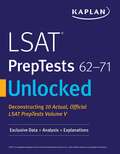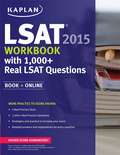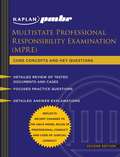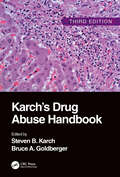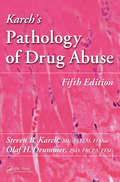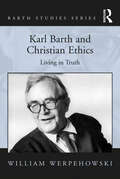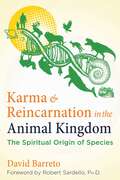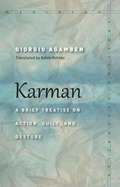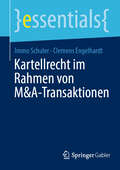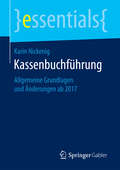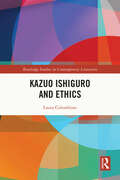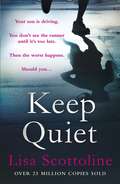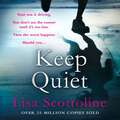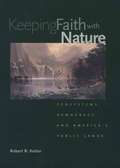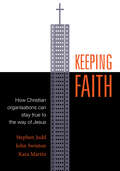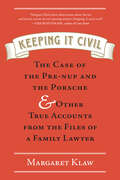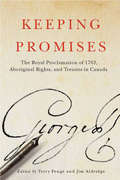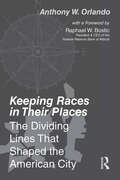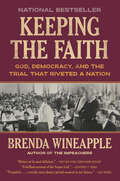- Table View
- List View
Kaplan Companion to LSAT PrepTests 62-71: Exclusive Data, Analysis & Explanations for 10 Actual, Official LSAT PrepTests Volume V
by KaplanTaking a practice test is great practice for the LSAT, but reviewing a practice test afterward is where you really improve. Supercharge your LSAT prep with Kaplan's comprehensive explanations for PrepTests 62-71. Every question and answer choice is discussed, along with detailed strategies for racking up points. In addition, you'll see sample sketchwork for logic games and sample roadmaps for reading comprehension passages. If you are new to the LSAT, a glossary offers definitions for terminology that will help you to think like the testmaker. *PrepTests 62-71 not included. LSAT® is a registered trademark of the Law School Admission Council, which neither sponsors nor endorses this product.
Kaplan LSAT Workbook 2015
by KaplanKaplan's LSAT Workbook 2015 is the perfect companion to our best-selling LSAT Premier book or for students looking for more practice. Kaplan's LSAT Workbook 2015 with 1,000+ Real LSAT Questions features: OVER 1,000 NEWLY RELEASED QUESTIONS: Recently-released LSAT practice questions for the best in realistic practice. DETAILED EXPLANATIONS: Easy-to-read, comprehensive explanations for every question and every answer choice. FOUR MOST RECENT FULL-LENGTH EXAMS: Four of the most recent full-length exams allow for more realistic practice. Use in conjunction with Kaplan's free "LSAT Proctor Anywhere" app available for iOS devices. PRODUCED BY KAPLAN'S PRODUCT DEVELOPMENT TEAM: The team behind Kaplan's world-leading LSAT prep courses has designed, developed and authored Kaplan's LSAT Workbook and Kaplan's LSAT Premier - the #1 best-selling comprehensive LSAT prep book on the market.
Kaplan PMBR: Multistate Professional Responsibility Exam (Second Edition)
by Kaplan PmbrThis book is designed to provide students with the focused review, effective practice, and suplemental study tools that are needed for success on the MPRE.
Karch's Drug Abuse Handbook
by Steven B. Karch and Bruce A. GoldbergerKarch’s Drug Abuse Handbook, Third Edition remains the quintessential compendium addressing the pharmacological, medical, and legal aspects of drugs and informing the forensic community of the latest scientific advances and emergent practices. For this edition, Dr. Karch has brought on clinical and forensic toxicology expert Dr. Bruce Goldberger, editor-in-chief of the Journal of Analytical Toxicology and president of the American Board of Forensic Toxicology, to serve as co-editor. In addition, world-renowned scientists and medical professionals have contributed their work and expertise in tackling the latest developments in drug testing, drug-related medical emergencies, and the drug toxicology. Topics addressed include genetic testing in drug death investigation, pathology, toxicogenetics, alcohol, post-mortem toxicology, new psychoactive substances, the latest legal issues and challenges as well as drugs and drug testing in sports, and the ethical, legal, and practical issues involved. Vivid pictures and diagrams throughout illustrate the pathological effects of drugs and the chemical make-up and breakdown of abused drugs. With unparalleled detail, the latest research and the highest level of authoritative medical scientific information, The Drug Abuse Handbook, Third Edition remains the definitive resource for drug related issues.
Karch's Pathology of Drug Abuse
by Steven B. Karch MD Olaf DrummerWritten in the same accessible manner as previous editions, the fifth edition of Karch‘s Pathology of Drug Abuse is an essential guide to the pathology, toxicology, and pharmacology of commonly abused drugs. The book focuses on the investigation of drug-related deaths, practical approaches to the detection of drug abuse, and discussions of medical
Karl Barth and Christian Ethics: Living in Truth (Barth Studies)
by William WerpehowskiThis critical study of Karl Barth's Christian theological ethics discusses Barth's controversial and characteristically misunderstood ethics of divine command. The surprising relation of his 'divine command ethics' to contemporary 'narrative theology' and 'virtue ethics' and specific moral themes concerning bonds between parents and children, the nature of truth telling, and the meaning of Christian love of God and neighbor are all discussed. This book reveals Barth's richness, depth, and insight, and places his work in constructive connection with salient themes in both Catholic and Protestant ethics. Attentive to the fullness of Barth's Christological vision and to the purposes and limits of his reflections on the Christian life in pursuit of the good, William Werpehowski also advances conversations in Christian ethics about the nature of practical deliberation and decision, the orientation and dispositions that embody moral faithfulness, and the question and features of 'natural morality.'
Karl Marx (Arguments of the Philosophers)
by Allen WoodThis is one of the most respected books on Marx's philosophical thought. Wood explains Marx's views from a philosophical standpoint and defends him against common misunderstandings and criticisms. All the major philosophical topics in Marx's work are considered: the central concept of alienation; historical materialism and Marx's account of social classes; the nature and social function of morality; philosophical materialism and Marx's atheism; and Marx's use of the Hegelian dialectical method and the Marxian theory of value.
Karl Marx (Arguments of the Philosophers)
by Wood AllenThis is one of the most respected books on Marx's philosophical thought. Wood explains Marx's views from a philosophical standpoint and defends Marx against common misunderstandings and criticisms of his views. All the major philosophical topics in Marx's work are considered: the central concept of alienation; historical materialism and Marx's account of social classes; the nature and social function of morality; philosophical materialism and Marx's atheism; and Marx's use of the Hegelian dialectical method and the Marxian theory of value.The second edition has been revised to include a new chapter on capitalist exploitation and new suggestions for further reading. Wood has also added a substantial new preface which looks at Marx's thought in light of the fall of the Soviet Union and our continued ambivalence towards capitalism, exploring Marx's continuing relevance in the twenty-first century.
Karma and Reincarnation in the Animal Kingdom: The Spiritual Origin of Species
by David BarretoInvestigates the spiritual anatomy and evolution of animals• Examines the anatomy of the spiritual bodies of animals, including their aura, etheric fields, chakras, and mental, astral, and buddhic bodies • Details how reincarnation and karma work in the animal kingdom, including how the way that animals die can have different effects on their spiritual bodies in the astral realms • Explores the spiritual, energetic, and psychic abilities of many animals and insects Where do the spirits of animals go after they die? Do animals have chakras or auras? Why were animals worshipped in ancient religions? Exploring these questions and more, David Barreto presents a deep investigation into the spiritual evolution of the animal kingdom, from ants and cockroaches to cats, dogs, owls, pigeons, dolphins, and whales. He examines the spiritual anatomy of animals, including their aura, etheric fields, chakras, and mental, astral, and buddhic bodies. Detailing how reincarnation works among various species, Barreto explores their experiences between physical lives, how they accrue karma, and how the way that animals die can have different effects on their spiritual bodies in the astral realms. Drawing on both modern physics and metaphysics, he reveals, for example, how dogs can love unconditionally because of their large electromagnetic field, which nourishes the etheric bodies of those around them, and how cats can detect subtle energy shifts and disharmonies and conduct etheric filtration while they sleep. Examining esoteric schools as well as ancient spiritual traditions around the world, the author explores how animals are viewed and worshipped in different religions and how animal adoration and animal-connected gods arose in ancient Egypt, India, and China. He looks at animal totems, animal archetypes, animals in alchemy, and the astral connections between animals and elementals. The author also examines the spiritual and energetic repercussions of meat consumption and animal sacrifice, revealing the astral and etheric components of slaughterhouses. Detailing the role of the animal kingdom in the Age of Aquarius, the author shows how, with the awakening of this new astrological era, animals will have their earthly lives elevated with lasting worth and dignity, equal to the love and respect they have been transmitting for millennia.
Karman: A Brief Treatise on Action, Guilt, and Gesture (Meridian: Crossing Aesthetics)
by Giorgio Agamben Adam KotskoWhat does it mean to be responsible for our actions? In this brief and elegant study, Giorgio Agamben traces our most profound moral intuitions back to their roots in the sphere of law and punishment. Moral accountability, human free agency, and even the very concept of cause and effect all find their origin in the language of the trial, which Western philosophy and theology both transform into the paradigm for all of human life. In his search for a way out of this destructive paradigm, Agamben not only draws on minority opinions within the Western tradition but engages at length with Buddhist texts and concepts for the first time. In sum, Karman deepens and rearticulates some of Agamben's core insights while breaking significant new ground.
Kartellrecht im Rahmen von M&A-Transaktionen (essentials)
by Clemens Engelhardt Immo SchulerIn diesem essential wird der typische Ablauf einer M&A-Transaktion unter besondere Berücksichtigung des Kartellrechts dargestellt. Neben den Fragen, inwieweit kartellrechtlich zulässig Information zwischen den beteiligten Unternehmen ausgetauscht werden dürfen und an welchen Stellen des M&A-Kaufvertrags Kartellrecht eine Rolle spielt, wird auch das kartellrechtliche Vollzugsverbot und das daraus resultierende fusionskontrollrechtliche Anmeldeerfordernis dargestellt.
Kartellrecht in der Unternehmenspraxis: Was Management, Compliance und Rechtsberater wissen müssen
by Thomas Kapp Guido Jansen Sebastian Felix JankaUnter Verzicht auf juristische Detaildiskussion gibt der Autor allen Unternehmern, Vorständen, Geschäftsführern und Aufsichtsräten einen praktischen Leitfaden zur schnellen Erfassung kartellrechtlicher Fragestellungen (Wettbewerbsbeschränkungen, Missbrauchskontrolle, Fusionskontrolle) an die Hand. Das erste Kartellrechtsbuch für Praktiker. Es enthält bereits die Neuregelungen der 8. GWB-Novelle.
Kartellrecht: Grundlagen des deutschen und europäischen Kartellrechts (essentials)
by Immo SchulerIn diesem essential werden die Grundlagen des deutschen und europäischen Kartellrechts kurz und übersichtlich aufbereitet. Nach einer kurzen wettbewerbstheoretischen Einführung zu den Zielen des Kartellrechts vermittelt der Autor zunächst die Grundlagen der „3 Säulen“ des Kartellrechts, das heißt des Kartellverbots, des Verbots des Missbrauchs einer marktbeherrschenden Stellung sowie der Zusammenschlusskontrolle. Dabei werden die jeweiligen Eingriffsvoraussetzungen, nach deutschem und nach europäischem Kartellrecht, ebenso beleuchtet wie die möglichen Rechtsfolgen im Falle eine Kartellrechtsverstoßes. Abschließend wird die weiterhin an Bedeutung gewinnende private Durchsetzung kartellrechtlicher Schadensersatzansprüche dargestellt.
Kassenbuchführung: Allgemeine Grundlagen und Änderungen ab 2017 (essentials)
by Karin NickenigKarin Nickenig befasst sich in diesem essential in aller Kürze mit den aktuell bestehenden Regelungen zur Kassenbuchführung und den geplanten Änderungen ab dem Jahr 2017 durch das Gesetz zum Schutz vor Manipulationen an digitalen Grundaufzeichnungen („Kassengesetz“). Mit Hilfe dieses essentials erhält der Praktiker einen Überblick über die stets fortschreitende Komplexität der Regelungen zur Kassenbuchführung.
Kayanerenkó: The Great Law of Peace
by Kayanesenh Paul WilliamsSeveral centuries ago, the five nations that would become the Haudenosaunee — Mohawk, Oneida, Onondaga, Cayuga, and Seneca — were locked in generations-long cycles of bloodshed. When they established Kayanerenkó:wa, the Great Law of Peace, they not only resolved intractable coinflicts, but also shaped a system of law and government that would maintain peace for generations to come. This law remains in place today in Haudenosaunee communities: an Indigenous legal system, distinctive, complex, and principled. It is not only a survivor, but a viable alternative to Euro-American systems of law. With its emphasis on lasting relationships, respect for the natural world, building consensus, and on making and maintaining peace, it stands in contrast to legal systems based on property, resource exploitation, and majority rule. Although Kayanerenkó:wa has been studied by anthropologists, linguists, and historians, it has not been the subject of legal scholarship. There are few texts to which judges, lawyers, researchers, or academics may refer for any understanding of specific Indigenous legal systems. Following the United Nations Declaration on the Rights of Indigenous Peoples, and a growing emphasis on reconciliation, Indigenous legal systems are increasingly relevant to the evolution of law and society. In Kayanerenkó:wa Great Law of Peace Kayanesenh Paul Williams, counsel to Indigenous nations for forty years, with a law practice based in the Grand River Territory of the Six Nations, brings the sum of his experience and expertise to this analysis of Kayanerenkó:wa as a living, principled legal system. In doing so, he puts a powerful tool in the hands of Indigenous and settler communities.
Kazuo Ishiguro and Ethics (Routledge Studies in Contemporary Literature)
by Laura ColombinoKazuo Ishiguro and Ethics addresses the philosophical issues that lie at the heart of Ishiguro’s fiction, shedding light on the moral condition of his characters – their sense of responsibility and pride in service, their attempts at self-determination and the value they assign to loyalty, love and friendship. Ethics in Ishiguro’s work is structured around the tension between the limits of the characters’ agency and their striving towards the good. Ishiguro’s novels are shown to tackle fundamental questions posed by ancient Greek philosophers, especially Plato, and modern Western ones, from Adam Smith through Jean-Paul Sartre to Martha Nussbaum. What is the human soul? What is dignity? What does it mean to be human? These issues are expressed in his narrative world through the universal and timeless language of myths, allegories and images that are both ancient and modern as well as cross-cultural.
Keep Quiet
by Lisa ScottolineOne decision. One family's future in ruins.When Jake Buckman decides to let Ryan, his sixteen-year-old son practice driving home along a deserted street, he has no idea of the deadly consequences.But in the darkness of night, a runner comes from nowhere and the hit is fatal.Now Jake and Ryan have two options: admit Ryan's responsibility ... or drive home as though nothing happened. What follows is not a clear-cut hit and run, but a split-second decision by a father who will do anything to protect his son.How much should a parent sacrifice for their child?And could any family survive the burden of such a terrible secret?
Keep Quiet
by Lisa ScottolineOne decision. One family's future in ruins.When Jake Buckman decides to let Ryan, his sixteen-year-old son practice driving home along a deserted street, he has no idea of the deadly consequences.But in the darkness of night, a runner comes from nowhere and the hit is fatal.Now Jake and Ryan have two options: admit Ryan's responsibility ... or drive home as though nothing happened. What follows is not a clear-cut hit and run, but a split-second decision by a father who will do anything to protect his son.How much should a parent sacrifice for their child?And could any family survive the burden of such a terrible secret?(P)2014 Macmillan Audio
Keep Your Day Job: Leverage Your Side Hustle To Grow Your Corporate Career, Regardless Of What HR Says You Can Do
by Dannie FountainAs millennials and Gen Z grow their influence in the workplace, side hustling and overemployment are emerging from the dark corners of the corporate world—but many companies still resist this trend. How can employees leverage the shifting power dynamic to build their own empires? Build now and ask forgiveness later: this book shows you how. Rich with insights from personal experience and doctoral research, this is the story of more than a decade of side hustling alongside successes, and failures, in a career in corporate America. But more importantly, it is a roadmap on how to successfully incorporate a side hustle into your life in a way that supports your day job too. Not everyone starts a side hustle to eventually quit their day job, and many individuals enjoy and take pride in the dual incomes they can earn this way. This book centers and prioritizes this path. No matter their industry, this book will resonate with readers who have been burned by their side hustle (or fear that they might be), as well as HR professionals who want to support change in corporate America and leaders who value and prioritize innovation to impact their workforce for the better.
Keeping Faith with Nature: Ecosystems, Democracy, and America's Public Lands
by Robert B. KeiterAs the twenty-first century dawns, public land policy is entering a new era. This timely book examines the historical, scientific, political, legal, and institutional developments that are changing management priorities and policies--developments that compel us to view the public lands as an integrated ecological entity and a key biodiversity stronghold. Once the background is set, each chapter opens with a specific natural resource controversy, ranging from the Pacific Northwest's spotted owl imbroglio to the struggle over southern Utah's Colorado Plateau country. Robert Keiter uses these case histories to analyze the ideas, forces, and institutions that are both fomenting and retarding change. Although Congress has the final say in how the public domain is managed, the public land agencies, federal courts, and western communities are each playing important roles in the transformation to an ecological management regime. At the same time, a newly emergent and home-grown collaborative process movement has given the public land constituencies a greater role in administering these lands. Arguing that we must integrate the new imperatives of ecosystem science with our devolutionary political tendencies, Keiter outlines a coherent new approach to natural resources policy.
Keeping Faith: How Christian Organisations Can Stay True to the Way of Jesus
by Stephen Judd John Swinton Kara MartinWe all can think of organisations that were established by Christians that are no longer recognisably Christian. In Keeping Faith, the authors outline the key components of organisational faithfulness – that is, what is needed for Christian organisations to stay true to the way of Jesus. They argue that the old reliance on statements of faith, or a set of Christian values, is insufficient. What is needed is a robust organisational theology that inhabits the enterprise’s structures, management, business policies, practices and relationships and is tailored to the purpose of the organisation.In this important book, you will find: a checklist to determine if your organisation is losing its faithfulness; an outline of some key components of organisational theology; examples, both positive and negative, of theological application in organisations; discussion questions for organisational reflection.With combined global experience in practical theology, running businesses and charities, and integrating faith and work, Judd, Swinton and Martin have created an important and essential book for every Christian organisation.
Keeping It Civil: The Case of the Pre-nup and the Porsche & Other True Accounts from the Files of a Family Lawyer
by Margaret KlawProvocative true cases that explore the intersection of our most intimate relationships and the law—and offer a window into how we define a family today.A woman seeking a divorce has no idea of the family finances—her husband doled out money only after she gave him requisition slips for her intended purchases. A lesbian couple wants to include their sperm donor in their child’s life—the sperm donor is the brother of one partner, so he will be the biological father as well as the child’s uncle. These are the clients who come knocking on family lawyer Margaret Klaw’s door, hoping for resolution.
Keeping Promises: The Royal Proclamation of 1763, Aboriginal Rights, and Treaties in Canada
by Terry Fenge Jim AldridgeIn 1763 King George III of Great Britain, victorious in the Seven Years War with France, issued a proclamation to organize the governance of territory newly acquired by the Crown in North America and the Caribbean. <P><P> The proclamation reserved land west of the Appalachian Mountains for Indians, and required the Crown to purchase Indian land through treaties, negotiated without coercion and in public, before issuing rights to newcomers to use and settle on the land. Marking its 250th anniversary Keeping Promises shows how central the application of the Proclamation is to the many treaties that followed it and the settlement and development of Canada. Promises have been made to Aboriginal peoples in historic treaties from the late eighteenth to the early twentieth centuries in Ontario, the Prairies, and the Mackenzie Valley, and in modern treaties from the 1970s onward, primarily in the North. In this collection, essays by historians, lawyers, treaty negotiators, and Aboriginal leaders explore how and how well these treaties are executed. Addresses by the governor general of Canada and the federal minister of Aboriginal Affairs and Northern Development are also included. In 2003 Aboriginal leaders formed the Land Claims Agreements Coalition to make sure that treaties - building blocks of Canada - are fully implemented. Unique in breadth and scope, Keeping Promises is a testament to the research, advocacy, solidarity, and accomplishments of this coalition and those holding the Crown to its commitments.
Keeping Races in Their Places: The Dividing Lines That Shaped the American City
by Anthony W. Orlando"A book perfect for this moment" –Katherine M. O’Regan, Former Assistant Secretary, US Department of Housing and Urban Development More than fifty years after the passage of the Fair Housing Act, American cities remain divided along the very same lines that this landmark legislation explicitly outlawed. Keeping Races in Their Places tells the story of these lines—who drew them, why they drew them, where they drew them, and how they continue to circumscribe residents’ opportunities to this very day. Weaving together sophisticated statistical analyses of more than a century’s worth of data with an engaging, accessible narrative that brings the numbers to life, Keeping Races in Their Places exposes the entrenched effects of redlining on American communities. This one-of-a-kind contribution to the real estate and urban economics literature applies the author’s original geographic information systems analyses to historical maps to reveal redlining’s causal role in shaping today’s cities. Spanning the era from the Great Migration to the Great Recession, Keeping Races in Their Places uncovers the roots of the Black-white wealth gap, the subprime lending crisis, and today’s lack of affordable housing in maps created by banks nearly a century ago. Most of all, it offers hope that with the latest scholarly tools we can pinpoint how things went wrong—and what we must do to make them right.
Keeping the Faith: God, Democracy, and the Trial That Riveted a Nation
by Brenda WineappleNATIONAL BESTSELLER • &“Brenda Wineapple&’s wonderful account of the Scopes trial sheds light not only on the battles of the past but on the struggles of the present.&”—Jon Meacham&“History at its most delicious.&”—The New York Times Book Review (front page review, Editors&’ Choice)The dramatic story of the 1925 Scopes trial, which captivated the nation and exposed profound divisions in America that still resonate today—divisions over the meaning of freedom, religion, education, censorship, and civil liberties in a democracy &“Propulsive . . . a terrific story about a pivotal moment in our history.&”—Ken BurnsONE OF THE CHICAGO TRIBUNE&’S TEN BEST BOOKS OF THE YEAR • A NEW YORKER BEST BOOK OF THE YEAR&“No subject possesses the minds of men like religious bigotry and hate, and these fires are being lighted today in America.&” So said legendary attorney Clarence Darrow as hundreds of people descended on the sleepy town of Dayton, Tennessee, for the trial of a schoolteacher named John T. Scopes, who was charged with breaking the law by teaching evolution to his biology class in a public school.Brenda Wineapple, the award-winning author of The Impeachers, explores how and why the Scopes trial quickly seemed a circus-like media sensation, drawing massive crowds and worldwide attention. Darrow, a brilliant and controversial lawyer, said in his electrifying defense of Scopes that people should be free to think, worship, and learn. William Jennings Bryan, three-time Democratic nominee for president, argued for the prosecution that evolution undermined the fundamental, literal truth of the Bible and created a society without morals, meaning, and hope.In Keeping the Faith, Wineapple takes us into the early years of the twentieth century—years of racism, intolerance, and world war—to illuminate, through this pivotal legal showdown, a seismic period in American history. At its heart, the Scopes trial dramatized conflicts over many of the fundamental values that define America, and that continue to divide Americans today.
